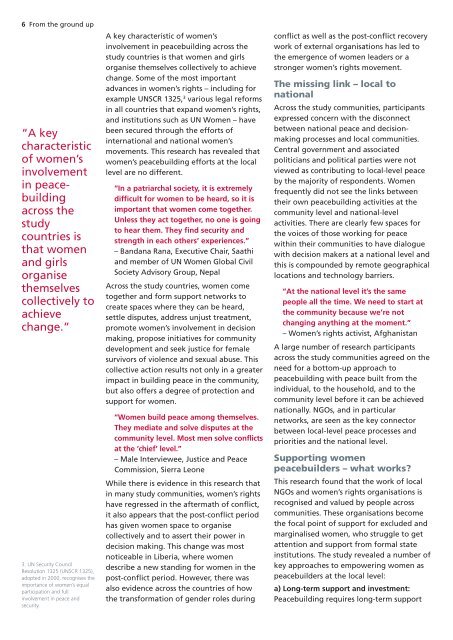From-the-ground-up_Womankind-and-ActionAid_FINAL
From-the-ground-up_Womankind-and-ActionAid_FINAL
From-the-ground-up_Womankind-and-ActionAid_FINAL
Create successful ePaper yourself
Turn your PDF publications into a flip-book with our unique Google optimized e-Paper software.
6 <strong>From</strong> <strong>the</strong> <strong>ground</strong> <strong>up</strong><br />
“A key<br />
characteristic<br />
of women’s<br />
involvement<br />
in peace -<br />
building<br />
across <strong>the</strong><br />
study<br />
countries is<br />
that women<br />
<strong>and</strong> girls<br />
organise<br />
<strong>the</strong>mselves<br />
collectively to<br />
achieve<br />
change.”<br />
3. UN Security Council<br />
Resolution 1325 (UNSCR 1325),<br />
adopted in 2000, recognises <strong>the</strong><br />
importance of women’s equal<br />
participation <strong>and</strong> full<br />
involvement in peace <strong>and</strong><br />
security.<br />
A key characteristic of women’s<br />
involvement in peacebuilding across <strong>the</strong><br />
study countries is that women <strong>and</strong> girls<br />
organise <strong>the</strong>mselves collectively to achieve<br />
change. Some of <strong>the</strong> most important<br />
advances in women’s rights – including for<br />
example UNSCR 1325, 3 various legal reforms<br />
in all countries that exp<strong>and</strong> women’s rights,<br />
<strong>and</strong> institutions such as UN Women – have<br />
been secured through <strong>the</strong> efforts of<br />
international <strong>and</strong> national women’s<br />
movements. This research has revealed that<br />
women’s peacebuilding efforts at <strong>the</strong> local<br />
level are no different.<br />
“In a patriarchal society, it is extremely<br />
difficult for women to be heard, so it is<br />
important that women come toge<strong>the</strong>r.<br />
Unless <strong>the</strong>y act toge<strong>the</strong>r, no one is going<br />
to hear <strong>the</strong>m. They find security <strong>and</strong><br />
strength in each o<strong>the</strong>rs’ experiences.”<br />
– B<strong>and</strong>ana Rana, Executive Chair, Saathi<br />
<strong>and</strong> member of UN Women Global Civil<br />
Society Advisory Gro<strong>up</strong>, Nepal<br />
Across <strong>the</strong> study countries, women come<br />
toge<strong>the</strong>r <strong>and</strong> form s<strong>up</strong>port networks to<br />
create spaces where <strong>the</strong>y can be heard,<br />
settle disputes, address unjust treatment,<br />
promote women’s involvement in decision<br />
making, propose initiatives for community<br />
development <strong>and</strong> seek justice for female<br />
survivors of violence <strong>and</strong> sexual abuse. This<br />
collective action results not only in a greater<br />
impact in building peace in <strong>the</strong> community,<br />
but also offers a degree of protection <strong>and</strong><br />
s<strong>up</strong>port for women.<br />
“Women build peace among <strong>the</strong>mselves.<br />
They mediate <strong>and</strong> solve disputes at <strong>the</strong><br />
community level. Most men solve conflicts<br />
at <strong>the</strong> ‘chief’ level.”<br />
– Male Interviewee, Justice <strong>and</strong> Peace<br />
Commission, Sierra Leone<br />
While <strong>the</strong>re is evidence in this research that<br />
in many study communities, women’s rights<br />
have regressed in <strong>the</strong> aftermath of conflict,<br />
it also appears that <strong>the</strong> post-conflict period<br />
has given women space to organise<br />
collectively <strong>and</strong> to assert <strong>the</strong>ir power in<br />
decision making. This change was most<br />
noticeable in Liberia, where women<br />
describe a new st<strong>and</strong>ing for women in <strong>the</strong><br />
post-conflict period. However, <strong>the</strong>re was<br />
also evidence across <strong>the</strong> countries of how<br />
<strong>the</strong> transformation of gender roles during<br />
conflict as well as <strong>the</strong> post-conflict recovery<br />
work of external organisations has led to<br />
<strong>the</strong> emergence of women leaders or a<br />
stronger women’s rights movement.<br />
The missing link – local to<br />
national<br />
Across <strong>the</strong> study communities, participants<br />
expressed concern with <strong>the</strong> disconnect<br />
between national peace <strong>and</strong> decisionmaking<br />
processes <strong>and</strong> local communities.<br />
Central government <strong>and</strong> associated<br />
politicians <strong>and</strong> political parties were not<br />
viewed as contributing to local-level peace<br />
by <strong>the</strong> majority of respondents. Women<br />
frequently did not see <strong>the</strong> links between<br />
<strong>the</strong>ir own peacebuilding activities at <strong>the</strong><br />
community level <strong>and</strong> national-level<br />
activities. There are clearly few spaces for<br />
<strong>the</strong> voices of those working for peace<br />
within <strong>the</strong>ir communities to have dialogue<br />
with decision makers at a national level <strong>and</strong><br />
this is compounded by remote geographical<br />
locations <strong>and</strong> technology barriers.<br />
“At <strong>the</strong> national level it’s <strong>the</strong> same<br />
people all <strong>the</strong> time. We need to start at<br />
<strong>the</strong> community because we’re not<br />
changing anything at <strong>the</strong> moment.”<br />
– Women’s rights activist, Afghanistan<br />
A large number of research participants<br />
across <strong>the</strong> study communities agreed on <strong>the</strong><br />
need for a bottom-<strong>up</strong> approach to<br />
peacebuilding with peace built from <strong>the</strong><br />
individual, to <strong>the</strong> household, <strong>and</strong> to <strong>the</strong><br />
community level before it can be achieved<br />
nationally. NGOs, <strong>and</strong> in particular<br />
networks, are seen as <strong>the</strong> key connector<br />
between local-level peace processes <strong>and</strong><br />
priorities <strong>and</strong> <strong>the</strong> national level.<br />
S<strong>up</strong>porting women<br />
peacebuilders – what works?<br />
This research found that <strong>the</strong> work of local<br />
NGOs <strong>and</strong> women’s rights organisations is<br />
recognised <strong>and</strong> valued by people across<br />
communities. These organisations become<br />
<strong>the</strong> focal point of s<strong>up</strong>port for excluded <strong>and</strong><br />
marginalised women, who struggle to get<br />
attention <strong>and</strong> s<strong>up</strong>port from formal state<br />
institutions. The study revealed a number of<br />
key approaches to empowering women as<br />
peacebuilders at <strong>the</strong> local level:<br />
a) Long-term s<strong>up</strong>port <strong>and</strong> investment:<br />
Peacebuilding requires long-term s<strong>up</strong>port


